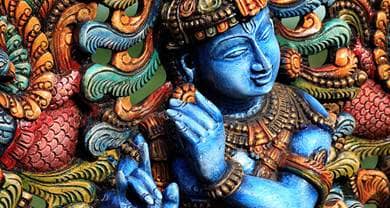- Trending:
- Pope Leo Xiv
- |
- Israel
- |
- Trump
- |
- Social Justice
- |
- Peace
- |
- Love

RELIGION LIBRARY
Hinduism
Modern Age
One way to understand modern Hinduism is to begin with what is typically called the "Hindu Renaissance," or "Reformation," which formally begins with the founding of the Brahmo Samaj in Calcutta in 1828. Tensions had been brewing for many decades among Calcutta's highly educated Hindus; they felt that their religious beliefs and practices were disrespected and in some cases prohibited by the British. But these Hindus also felt that many Hindus in India had moved far away from what they regarded as the core of Hinduism. So, as much as the Brahmo Samaj and the larger "Hindu Renaissance" that it started is, first of all, a reaction to colonialism and Christian missionary efforts, it was also very much an internal reform.
 The Brahmo Samaj was founded by Ram Mohan Roy (1772-1833). Roy's basic principles have come to be an extremely important element in modern Hinduism. Among the important positions adopted by the organization was that Hinduism should not be based on superstitious belief in gods and goddesses, but instead on the rationality of the Upanishads. They held that much of what Hindus do as Hindus—venerate the gods, perform rituals, observe caste distinctions—was simply not Hinduism. They argued that the Upanishads contained the true essence of Hindusim.
The Brahmo Samaj was founded by Ram Mohan Roy (1772-1833). Roy's basic principles have come to be an extremely important element in modern Hinduism. Among the important positions adopted by the organization was that Hinduism should not be based on superstitious belief in gods and goddesses, but instead on the rationality of the Upanishads. They held that much of what Hindus do as Hindus—venerate the gods, perform rituals, observe caste distinctions—was simply not Hinduism. They argued that the Upanishads contained the true essence of Hindusim.
Other important figures in the  Hindu Renaissance include Debendranath Tagore, who furthered Ram Mohan Roy's cause, putting special emphasis on the Upanishads and the importance of Hindu education. Tagore's eldest son, Dwijendranath, set up an important Hindu school at the family estate, Santineketan; his youngest son, Rabindranath, became India's (and Asia's) first Nobel Laureate in 1913 when he was awarded the
Hindu Renaissance include Debendranath Tagore, who furthered Ram Mohan Roy's cause, putting special emphasis on the Upanishads and the importance of Hindu education. Tagore's eldest son, Dwijendranath, set up an important Hindu school at the family estate, Santineketan; his youngest son, Rabindranath, became India's (and Asia's) first Nobel Laureate in 1913 when he was awarded the  Nobel Prize in Literature. Keshub Candra Sen (1838-84) was particularly important in this movement, criticizing the ways Brahmins denigrated other Hindus and, at the same time, attacking Christian missionary activities in India.
Nobel Prize in Literature. Keshub Candra Sen (1838-84) was particularly important in this movement, criticizing the ways Brahmins denigrated other Hindus and, at the same time, attacking Christian missionary activities in India.
The movement splintered somewhat with Swami Dayandra Sarasvati (1824-83) who, in contrast to the Brahmo Samaj's emphasis on the Upanishads, argued the Vedas are the essence of Hinduism.
 Swami Vivekenanda (1863-1902) is also very important here. Unlike the other Hindu reformers, Vivekenanda did not dedicate most of his efforts to combating the British and Christian presence in India; rather, he became a kind of Hindu missionary to the West. He went to the World Parliament of Religions in Chicago in 1893 and impressed many with his eloquent presentation of Hinduism. His presence in the West led to the founding of Vedanta Societies throughout America and Europe. He also founded the influential Ramakrishna Mission in Calcutta.
Swami Vivekenanda (1863-1902) is also very important here. Unlike the other Hindu reformers, Vivekenanda did not dedicate most of his efforts to combating the British and Christian presence in India; rather, he became a kind of Hindu missionary to the West. He went to the World Parliament of Religions in Chicago in 1893 and impressed many with his eloquent presentation of Hinduism. His presence in the West led to the founding of Vedanta Societies throughout America and Europe. He also founded the influential Ramakrishna Mission in Calcutta.
 Mahatma Gandhi (1869-1948) is without question the most prominent, and arguably the most influential, of the figures associated with modern Hinduism. Gandhi points to one of the central tensions of modernity and Hinduism: on the one hand, Gandhi was a traditionalist, holding up the Bhagavad Gita as the pinnacle of Hinduism, singing the praises of a return to a unified, whole, pre-colonial India; on the other hand, though, Gandhi was radically progressive, advocating the destruction of caste, the tolerance for other religions, and the elevation of women. Indeed, Gandhi was assassinated by an orthodox Hindu who felt that he was undermining the religion.
Mahatma Gandhi (1869-1948) is without question the most prominent, and arguably the most influential, of the figures associated with modern Hinduism. Gandhi points to one of the central tensions of modernity and Hinduism: on the one hand, Gandhi was a traditionalist, holding up the Bhagavad Gita as the pinnacle of Hinduism, singing the praises of a return to a unified, whole, pre-colonial India; on the other hand, though, Gandhi was radically progressive, advocating the destruction of caste, the tolerance for other religions, and the elevation of women. Indeed, Gandhi was assassinated by an orthodox Hindu who felt that he was undermining the religion.
 In late 1992, an event took place in the sacred city of Ayodhya that would, for at least the next decade, have a profound effect on Hinduism in India. An angry mob of Hindus destroyed the Babri Masjid, a major Islamic mosque that the Hindus claim had been built on the very site where the Hindu god Rama was born. The actual destruction of the mosque was the culmination of years of dispute about the site, an argument that was largely fueled by a growing conservative, militant voice in Hinduism. Although it is not exactly correct to call this "Fundamentalism," this movement does have some aspects that make such a label appropriate.
In late 1992, an event took place in the sacred city of Ayodhya that would, for at least the next decade, have a profound effect on Hinduism in India. An angry mob of Hindus destroyed the Babri Masjid, a major Islamic mosque that the Hindus claim had been built on the very site where the Hindu god Rama was born. The actual destruction of the mosque was the culmination of years of dispute about the site, an argument that was largely fueled by a growing conservative, militant voice in Hinduism. Although it is not exactly correct to call this "Fundamentalism," this movement does have some aspects that make such a label appropriate.
These Hindus argue that India is a not only the home of Hinduism, but its exclusive domain, and they argue that other religious groups—Christians, and most of all Muslims—do not belong in India, which is a sacred, Hindu country. Furthermore, they assert that Hinduism is not simply a religion, not simply something does some of the time. Hinduism is an all-encompassing worldview, and thus should inform every aspect of Indian social and political life.
It would be wrong to think that Hinduism in the modern age can be easily or uniformly characterized. Certainly there are substantial challenges and, as a result, new developments. At the same time, however, practices and beliefs that have existed for thousands of years are maintained.
Study Questions:
1. What is the Brahmo Samaj? How was it developed?
2. Who was Swami Vivekenanda?
3. Why was Gandhi controversial?










